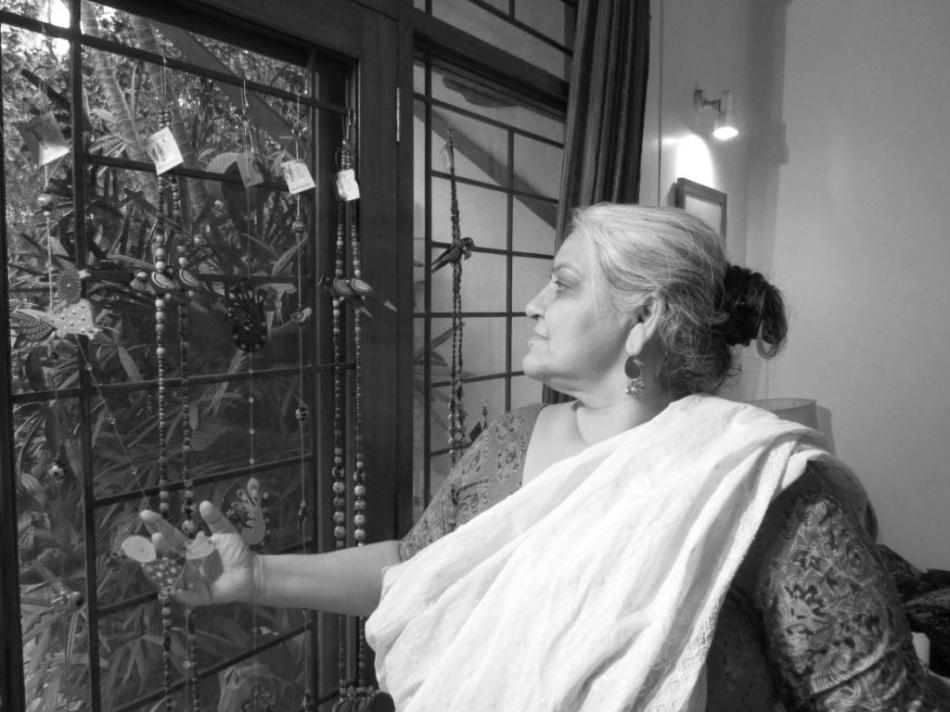Madhavi Kuckreja briefly toyed with the idea of marriage when she was in her 20s. “Then I realised it won’t work for me,” decided the social activist, who instead introspected on what drives people to marriage like moths to a flame. “I liked kids and the comfort of close relationships,” she reasoned, but why marry just for that?
So, at 32, she went ahead and had a biological baby while single – something that would have scandalized all classes of Indian society, not just the rural communities she worked with.
But Madhavi’s loved ones could only sigh: “There she goes.”
Born to a privileged Punjabi family, Madhavi was a natural leader, and headed her students’ union at Lady Shri Ram College, Delhi, where she did her graduation.
For her Master’s in international relations, she chose the famed New School for Social Research in Manhattan, and worked in New York for two years, taking a year off to travel around the world, from Turkey and Egypt to Peru, Bolivia and Brazil.
On her return to India, she decided to move to Chitrakoot (a part of which is in Uttar Pradesh) for a year, and volunteered to enable Dalit women with useful and transformative skills such as understanding hand-pump mechanics.
A year turned into 14.

Shaken with the condition of women in backward areas – especially those who had been raped, abandoned by families, or were victims of domestic violence – the activist decided to stay on and set up her first NGO, Vanangana (the word has two meanings: ‘clearing in the forest’, and ‘woman of the forest’).
“As long as marriage is central for women, things in India are not going to change,” says Madhavi, who began educating girls – especially battered wives in the most impoverished areas of UP’s Banda and Chitrakoot – and training them to be financially independent.
She gave workshops on self-empowerment and legal rights. “They asked me, ‘If not marriage, then what?’ I told them marriage is about bloodlines, money, inheritance – but, for women, it comes with patriarchy, inherent violence and inequality.”
Soon, the young feminist realised she’d have to walk her talk: she couldn’t well preach against marriage if she gave in to social pressure from back home to get married herself. So she had a baby outside marriage. After the initial outrage, her defiant act sealed Madhavi’s position as a fearless non-conformist.
In 2004, she handed over the reins of Vanangana to the local women, and moved to Lucknow, where she began sheltering victims of sexual abuse, orphans and children who’d run away from home due to violence.

Soon, her ‘family’ of foster kids grew, and today, she has 20 of them, who either live with her, squeezed into her little two-bedroom flat in Lucknow, or study in boarding school.
It wasn’t easy being a single mom, or even getting a passport for her son without a husband’s name. “If that was happening to someone like me, imagine the lives of these single mothers in villages,” Madhavi shakes her head, seated in her parents’ home in Delhi.
“They had no crèches for kids, no support – how could they make a living and be independent? Exerting sexuality is not an option for them; society can only tolerate widows and divorcees if they are bechaaris (pitiable), not empowered.”
The experience taught her about the inherent strength in women, their resilience and ability to see the bright side even in the darkest situations.
Madhavi’s parents and brother, who have worked in the corporate world and lead ‘regular’ urban lives, supported her work. Around 13 years ago, she set up another non-profit, Sanatkada, to curate and retail handicrafts from villages around India at her crafts outlet in Lucknow and through exhibitions in Delhi.
Her employees are committed for life to the cause: Nasreen, for instance, who uses only her first name, has been with Madhavi for 10 years. They also organize food festivals and publish various books to do with the oral history of Awadh.
The Sanatkada Lucknow Festival, sponsored by automobile major Mahindra, is one of the most popular events in town. “We had a stall once for home-cooked lal mirch ka keema – it was all sold out in a record 12 minutes,” she laughs.

Ten years ago, Madhavi fell in love in her usual non-conformist way: Askari Naqvi, a performance artist, is not only Muslim but also 24 years younger than her. “There she goes again,” her loved ones sighed.
The couple adopted a baby girl, now 10 months old. “I’m changing nappies again after a gap of 21 years,” Madhavi smiles, bouncing the gurgling baby on her knee.
The couple is not married, of course.
For news on upcoming festivals and exhibitions, follow @Sanatkada on Facebook
This is the second part of the ‘Agent of Change’ series published in eShe magazine’s May 2018 issue. (Part 1, 3, 4)
Syndicated to CNBCTV18.com


Pingback: The Woman Behind eShe: Aekta Kapoor - Girl Power Talk
M admiring this vibrant lady since the day I saw her first time in Sanat-kada 7-8 yrs before………
LikeLike
Since the day I know about the superwoman in the name as Madhvi Kuckreja, I personally feel that nothing is bigger than serving the humanity.
I feel lucky myself to be a part of such wonderful community and also got a chance to meet someone like you.
Thank a ton ma’am for being constantly serving for the humanity
LikeLike
There you go Madhvi di …. I really admire you 🙂
LikeLike
Congratulation
LikeLike